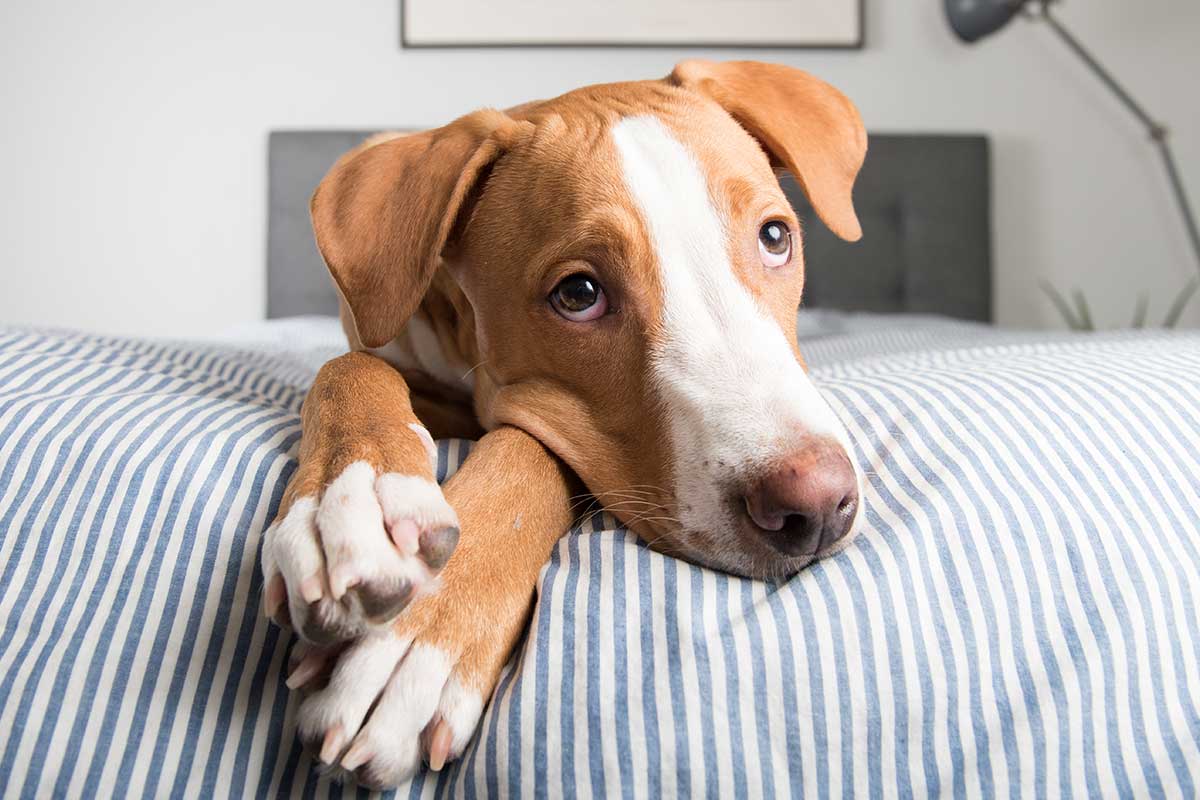You’ve had a long day and all you want to do is slide in between the sheets. As you do so, however, you feel a cold wet spot. Ugh! Your dog has urinated on your bed.
Why Does This Happen?
Many theories have been offered as to why some dogs urinate on their owners’ beds. If your dog is young, he may have some housetraining issues and could have an accident on the bed just as he might in other places in the house. A geriatric dog might be developing incontinence and leak while sleeping on the bed. A frightened dog could urinate when scared after first choosing the bed as a place of safety.
Adolescent dogs are most likely to urinate on the bed. Dogs between nine and fourteen months of age (give or take a month or two on each end) are more apt to urinate on the bed just because they are teenagers. Teenagers do weird things and sometimes we don’t know why they do what they do.
Contrary to popular belief dogs don’t urinate on the bed to “get back at you,” nor do they do it to be dominant. Dogs like our beds because they smell like us; after all, we spend seven or eight hours a night in bed.
Prevent Access to the Bed
If your dog has peed on your bed, it’s important to prevent his access to it. This is especially important when you aren’t home or are too busy to supervise him. Just close your bedroom door.
When you’re going in and out of your bedroom, such as while getting ready for work, put a leash on your dog and ask him to lie down and stay with you. The leash isn’t punishment but simply a reminder that you would like his compliance.
If your dog has been invited up on the bed previously you can still do that but only while you are there with him. If you get up, so does he. Otherwise, just don’t let him get on the bed.
Managing the Situation
Each dog and owner situation is unique so the approach to solving the problem will be also. If your dog is young and having housetraining issues, prevent access to the bed and work on those housetraining skills. Talk to a trainer for some help if you aren’t making the progress you’d like to see.
Often the frightened dog could use professional help, too. A kind training program can help these dogs gain confidence.
Make sure your incontinent geriatric dog sees the veterinarian. Incontinence can be caused by a variety of things, including old age, disease, and medications. Since you won’t want to evict the old dog from your bed over something she can’t control, use dog diapers or potty pads to protect your bed.
Training can help the teenage dog, focusing his brain on obedience skills, household rules, and even trick training. Anything to keep that brilliant mind busy.
Avoid Angry Reactions
When you climb into bed and find a wet spot it’s understandable that anger will probably be your first reaction. However, as much as possible don’t express that anger to your dog. Anger doesn’t teach your dog anything, except that you may be scary and unpredictable.
Instead, move your dog someplace else until you’ve calmed down. Clean up your bed. Make a cup of chamomile tea to relieve your anger; then promise yourself and your dog that you’ll think about this in the morning.
This article was reviewed/edited by board-certified veterinary behaviorist Dr. Kenneth Martin and/or veterinary technician specialist in behavior Debbie Martin, LVT.








